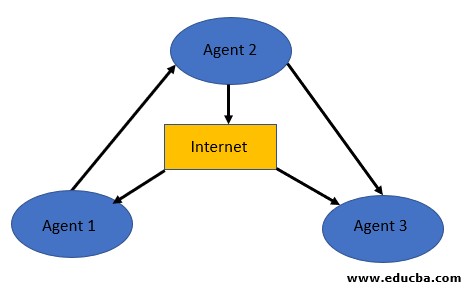Updated June 26, 2023

Introduction to Mobile Agents
Mobile agents are a technology that is emerging through mobile computing and has an impact so much that it eases the design, implementation, and distribution system. It allows you to reduce the traffic through your network and help you eliminate network latency problems by effective means. More importantly, they help you construct a fault-tolerant system that is highly robust. They create it with their ability to operate independently through the processes that have created them. This indirectly benefits the end-users who are using them.
What are Mobile Agents?
A mobile agent is an agent software (a piece of code, more precisely) featured with autonomy, social ability, self-learning, and, important of these all, mobility which makes a combination with computer software and the data that can move from one computer to another by itself provided that both of those computers are in the same network, i.e., they do not need a communication node and can function even if a user is not connected to the network.
How Mobile Agents Works?
Mobile agents move from one system to another. This is similar to visiting a web page (The browser we use downloads and presents us a copy of that webpage. In case of multiple versions, it downloads and presents us a version of that webpage). The mobile agent moves from various versions of the data itself. When moved, a mobile agent saves one version of its state (a copy of the processing image), transfers it to the new system or host, and starts execution from the previous checkpoint into the new system or host. The method minimizes the risk of exposing user data, making it secure and popular.
They are often known as transportable agents. A more logical reason behind this is that they can transfer data from one system to another without a corresponding communication node.
They are classified into two types, as mentioned below:
- Mobile agents with pre-defined paths: These types of mobile agents follow a predefined static path while migrating.
- Mobile agents with no pre-defined path or Free-Roaming Mobile Agents: These types choose their paths because they have a dynamic migration path. We can say that they decide the migration path on their own (based on the network strength).
Features of Mobile Agents
Mobile agents have multiple salient features, out of which Mobility stands out. Even when the user is logged off from a particular system, mobile agents can function independently, demonstrate autonomous path searching and intelligent transfers, and maintain communication between systems. They start to access the data exactly from the same point where they have left. These features make them handier in distribution systems.
1. Mobility
They are not limited to their source code. They can move freely from one node to another. Also, they carry the data from the previous node with them, which makes them more valuable as users can start working from exactly where they had things left. Moreover, it also has another advantage; even if the user is offline, the mobile agent can still do its migration work or be functional. These features make them available to work on mobile.
2. Intelligence
They are intelligent and hold the power to enhance their knowledge about the host node. They work intelligently when moving to the new host by keeping the knowledge of the old hosts secure and open to grab the knowledge about the new host. Even in the event of user disconnection, the agents retain the capability to establish a connection with the host node.
3. Autonomous
They are autonomous and can work on their own. Mobile agents have their functionality restricted to user commands or actions. However, in certain cases, they can continue to operate independently or make decisions autonomously even when the user is offline, choosing their own path of action.
4. Communicative
They are communicative. They constantly communicate with the host node and the node where they transfer; they communicate with different users and systems. Do you think it is all possible without establishing secure communication?
The image below shows the working of the mobile agents.
Here, we can see that the data from one agent is being sent to the Internet, and the same data is being transferred from the Internet to Agent 1 and Agent 3, and this is the same data Agent 1 sends to Agent 2. This means the data bundles can relocate through different agents from one place to another. This reduces network traffic.
Advantages of Mobile Agents
- Reduce network load by carrying data (relocatable data package) with them from the host server.
- Autonomously move between servers.
- Can work on multiple networks simultaneously (parallel processing), which increases efficiency.
- Maintaining mobile agents is relatively easy and often described as maintenance-friendly.
- Even if the user is disconnected or logged out, the agents can remain active or operational, which makes them highly tolerant of network faults.
- They are intelligent as they can make a difference between agents’ actions and actions taken by the host environment, which makes them dynamically adaptable.
Disadvantage of Mobile Agents
- They sometimes can possess a security threat to the data they transport from one host to another.
Applications
- E-Commerce, Logistics, Network Management, Traffic Control, and Robotic Applications often use mobile agents.
- They are also useful in Mobile Computing, Grid Computing, Parallel Computing, etc.
Conclusion
Mobile agents are useful as they travel from one system to another and transfer data. Even in the event of user disconnection, the agents retain the capability to establish a connection with the host node. They are two types: One’s those with a fixed static path to travel, and another is dynamically intelligent in that they can decide on a traveling path on their own.
Recommended Articles
This is a guide to Mobile Agents. Here we discuss the introduction, working, features, advantages, disadvantage, and applications of Mobile Agents. You may also have a look at the following articles to learn more –


